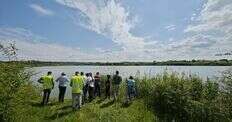- Solvay pilots IUCN RHINO at its soda ash and sodium bicarbonate site in Dombasle, France.
- The initiative integrates the STAR metric to measure biodiversity impact.
- Dombasle's existing biodiversity roadmap supports the pilot.
- The site is undergoing a major sustainability transformation.

Overview
Solvay is piloting the IUCN RHINO approach at its soda ash and sodium bicarbonate manufacturing site in Dombasle, France. This initiative is part of Solvay's partnership with the International Union for the Conservation of Nature (IUCN) to translate global biodiversity goals into local actions.
Methodology
The pilot integrates the Species Threat Abatement and Restoration (STAR) metric, allowing Solvay to systematically assess site impacts, set evidence-based targets, and measure contributions to species survival and ecosystem health. The Dombasle site, with its existing biodiversity roadmap, serves as a real-world laboratory for testing and refining this approach.
Sustainability Efforts
The Dombasle site is undergoing a significant sustainability transformation, including an energy transition project and the piloting of the e.Solvay process. These efforts aim to reduce natural resource and energy consumption, cut CO2 emissions, and eliminate residues, making it an ideal hub for developing a comprehensive biodiversity blueprint.
Action Plan
The roadmap includes defining SMART objectives for biodiversity gains, implementing compensatory measures like ecological corridors, and prioritizing proactive management to eliminate ecological traps. It also involves comprehensive ecological inventories, regional connectivity programs, and options to reduce the impact of discharged water.
Collaboration
This effort includes an independent review of the site and engagement with local NGO partners, ensuring the roadmap is locally relevant and aligns with the Kunming-Montreal Global Biodiversity Framework.

